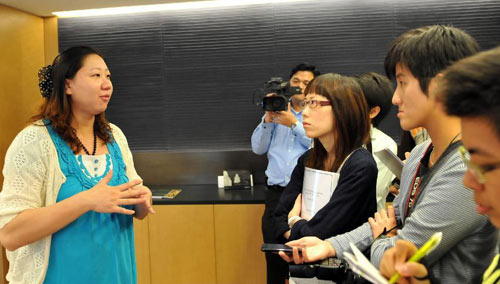Former badminton star maintains innocence in doping case
 0 Comment(s)
0 Comment(s) Print
Print E-mail
China Daily, November 1, 2011
E-mail
China Daily, November 1, 2011
 |
|
Pregnant Zhou Mi (L) speaks to journalists at a news conference in Hong Kong, Oct 27, 2011. [Photo/Xinhua] |
The world's former top player in women's badminton Zhou Mi on Thursday maintained her innocence in a doping case, presenting expert evidence that supports her explanation for the incident.
A pregnant Zhou, 32, appeared at a news conference here, introducing her new efforts to clear her name from a two-year ban.
The Badminton World Federation imposed the suspension on Sept 1, 2010 after traces of banned steroid clenbuteral were found in her urine sample during an out-of-competition doping test in June 2010.
Zhou, who won a bronze medal for China at the Athens Olympics in 2004 before joining the Hong Kong team in 2006, appealed to the Court of Arbitration for Sports on September 21 but failed to file all relevant appeal papers by the deadline of October 1, 2010.
She presented at the news conference a Hair-Drug Test Report dated Nov 26, 2010, conducted by the Hong Kong University of Science and Technology Laboratory for Molecular Testing, which indicated that the banned substance found in her hair sample at the material time was of "a very low concentration".
An independent assessment produced by Dr. Lam Hon Wah of the Department of Biology and Chemistry of the City University of Hong Kong stated that the low concentration of clenbuteral found in her system was "inconsistent with what would be found in an athlete who regularly ingests clenbuteral for performance enhancing purposes".
Dr. Lam supported Zhou's earlier allegation, noting that it was possible that Zhou had ingested clenbuteral through her "unknowing consumption of clenbuteral tainted pork".
"We know clenbuteral can be found in contaminated pork, which is not uncommon in China, and if the amount is very low, the player could have a strong case to argue," a source close to the case was quoted by the local South China Morning Post.
Zhou hoped that the new reports could raise her chance of restoring her reputation, particularly in light of recent cases in which bans were overturned because of similar low concentrations in athletes including former Tour de France champion Alberto Contador.
However, it was not very likely that Zhou would still be able to appeal against her ban after 14 months. Zhou noted that as a practically retired athlete, the main motivation of all her efforts was to prove her innocence, which is "very important" to an athlete and to her coming child.
Zhou became the world's top-ranked women player at the age of 29 in October 2008 and had been receiving a monthly scholarship of 25,000 HK dollars from the Hong Kong Sports Institute before the doping incident.
After the ban was imposed, Zhou returned to the Chinese mainland. She got married and was expecting her first child in Beijing.






Go to Forum >>0 Comment(s)